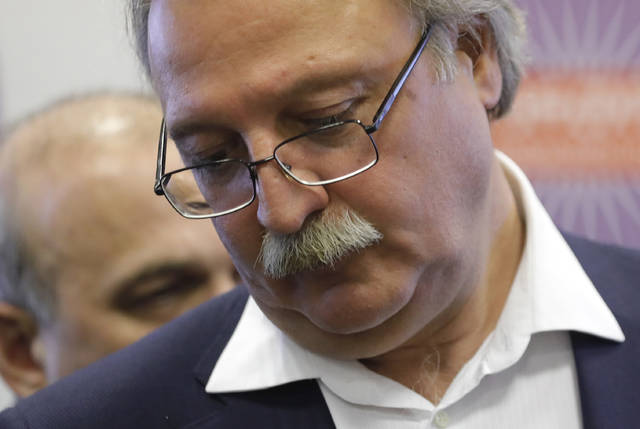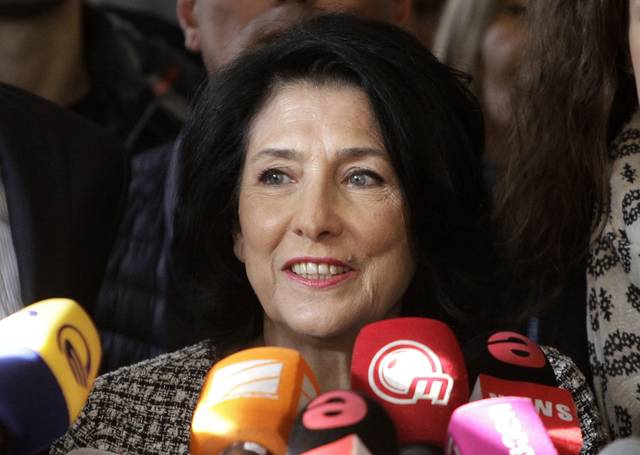TBILISI, Georgia — A French-born former foreign minister of Georgia celebrated what she claims is her victory in a tight presidential runoff Wednesday that marks the last time Georgians elect their head of state by popular vote.
An exit poll conducted by Edison Research for Rustavi 2 television showed the 66-year-old Salome Zurabishvili backed by the ruling Georgian Dream party winning 55 percent of the vote, while her rival, the 60-year-old Grigol Vashadze, who was supported by a coalition of opposition forces, was trailing behind with 45 percent.
The Central Election Commission said that with just over half of all the precincts counted, Zurabishvili was leading with 58 percent while Vashadze had 42 percent of the ballot.
Polls opened at 8 a.m. (0400 GMT) and closed at 8 p.m. (1600 GMT).
Edison Research interviewed 15,000 voters across 115 precincts in Georgia. It said its poll had a margin of error of 3 percentage points.
Vashadze, who also served a stint as Georgia’s foreign minister, refused to concede defeat, saying he would wait for full preliminary results, which are expected Thursday.
Georgia, a nation of nearly 4 million people in the volatile Caucasus region south of Russia, is transitioning to a parliamentary republic. Presidential powers have been substantially reduced with the prime minister becoming the most powerful figure in the country. After the new president’s six-year term ends, future heads of state will be chosen by delegates.
“Our choice is peaceful Georgia, united country and of equal citizens,” Zurabishvili said after seeing the exit poll showing her victory. “Our choice is the dialogue with those parts of the society who today has not voted for me and who today don’t agree with us. But we all are citizens of one country.”
Though the election lacks the usual importance, it is seen as a crucial test for Georgian Dream that is led and funded by billionaire Bidzina Ivanishvili who made his fortune in Russia.
It has dominated the nation’s political scene since defeating former president Mikheil Saakashvili’s United National Movement in 2012. Ivanishvili briefly served as prime minister in 2012-2013 and has remained a prominent force in Georgian politics ever since.
After the polls closed, Saakashvili spoke on Rustavi 2 television, claiming that the vote was rigged and calling for protests to annul the results.
Zurabishvili ran as an independent but was backed by Georgian Dream, while Vashadze was supported by a coalition that includes the United National Movement. They won 39 and 38 percent respectively in the first round last month.
Zurabishvili was born in France and served as French ambassador to Georgia until becoming Georgia’s foreign minister in 2004. She was fired the following year and some Georgians still look at her foreign background with suspicion and criticize her for her contention that Georgia started the 2008 war with Russia.
Zurabishvili’s opponents cast her as a pro-Russia candidate — the claim she and Georgian Dream strongly denied. Zurabishvili argued that her background is a strong qualification for serving as Georgian president as the country seeks closer ties with the European Union.
“Diplomatic work in France for me was also a work for Georgia,” Zurabishvili said. “Everyone knew that I am Georgian who fights for its country. I knew very well the price of independence and freedom, because I am the child of the country whose ancestors have sacrificed themselves for the independence and freedom.”
Vashadze, who served as Georgia’s foreign minister in 2008-2012, vowed to re-establish control over the breakaway provinces of South Ossetia and Abkhazia by peaceful means. Georgia entirely lost control over both provinces after the war with Russia a decade ago, which erupted when Saakashvili made a failed attempt to reclaim sovereignty over South Ossetia.
“Georgia has outlived many empires and will definitely outlive the current Russian empire,” Vashadze said.
He also vowed to pardon Saakashvili, who was stripped of his citizenship in 2015 and sentenced in absentia for abuse of power.
Observers saw the vote as a key test before the 2020 parliamentary election.
“For Georgian Dream, the stakes are especially high and it struggles very much … to win in the second round,” said Gia Nodia, the founder of the Caucasus Institute for Peace, Democracy and Development, an independent think-tank.
Earlier this month, the Georgian government announced that a charitable foundation controlled by Ivanishvili promised to write off the debts of 600,000 people, a move described by critics as an attempt to buy votes before the runoff.



